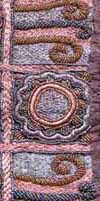41. AN INSTRUCTIVE DIALOGUE
From its very inception
the Khadi movement, Swadeshi movement as it was then called, evoked much
criticism from the mill-owners. The late Umar Sobani, a capable mill-owner
himself, not only gave me the benefit of his own knowledge and experience,
but kept me in touch with the opinion of the other mill-owners as well.
The argument advanced by one of these deeply impressed him. He pressed
me to meet him. I agreed. Mr. Sobani arranged the interview. The mill-owner
opened the conversation.
'You know that there has been
Swadeshi agitation before now?'
'Yes, I do,' I replied.
'You are also aware that in
the days of the Partition [of Bengal] we, the mill-owners, fully exploited
the Swadeshi movement. When it was at its height, we raised the prices
of cloth, and did even worse things.'
'Yes, I have heard something
about it, and it has grieved me.'
'I can understand your grief,
but I can see no ground for it. We are not conducting our business out
of philanthropy. We do it for profit, we have got to satisfy the shareholders.
The price of an article is governed by the demand for it. Who can check
the law of demand and supply? The Bengalis should have known that their
agitation was bound to send up the price of Swadeshi cloth by stimulating
the demand for it.'
I interrupted: 'The Bengalis,
like me, were trustful in their nature. They believed, in the fullness
of their faith, that the mill-owners would not be so utterly selfish and
unpatriotic as to betray their country in the hour of its need, and even
to go the length, as they did, of fraudulently passing off foreign cloth
as Swadeshi.'
'I knew your believing nature,'
he rejoined, 'that is why I put you to the trouble of coming to me, so
that I might warn you against falling into the same error as these simple-hearted
Bengalis'.
With these words the mill-owner
beckoned to his clerk, who was standing by, to produce samples of the stuff
that was being manufactured in his mill. Pointing to it he said: 'Look
at this stuff. This is the latest variety turned out by our mill. It is
meeting with a widespread demand. We manufacture it from the waste. Naturally,
therefore, it is cheap. We send it as far North as the valleys of the Himalayas.
We have agencies all over the country, even in places where your voice
or your agents can never reach. You can thus see that we do not stand in
need of more agents. Besides, you ought to know that India's production
of cloth falls far short of its requirements. The question of Swadeshi,
therefore, largely resolves itself into one of production. The moment we
can increase our production sufficiently, and improve its quality to the
necessary extent, the import of foreign cloth will automatically cease.
My advice to you, therefore, is not to carry on your agitation on its present
lines, but to turn your attention to the erection of fresh mills. What
we need is not propaganda to inflate demand for our goods, but greater
production.'
'Then surely, your will bless
my effort, if I am already engaged in that very thing?' I asked.
'How can that be?' he exclaimed,
a bit puzzled, 'but maybe you are thinking of promoting the establishment
of new mills, in which case you certainly deserve to be congratulated.'
'I am not doing exactly that,'
I explained, 'but I am engaged in the revival of the spinning wheel.'
'What is that?' he asked, feeling
still more at sea. I told him all about the spinning wheel, and the story
of my long quest after it, and added, 'I am entirely of your opinion; it
is no use my becoming virtually an agent for the mills. That would do more
harm than good to the country. Our mills will not be in want of custom
for a long time to come. My work should be, and therefore is, to organize
the production of handspun cloth, and to find means for the disposal of
the Khadi thus produced. I am, therefore, concentrating my attention on
the production of Khadi. I swear by this form of Swadeshi, because through
it I can provide work to the semi-starved, semi-employed women of India.
My idea is to get these women to spin yarn, and to clothe the people of
India with Khadi woven out of it. I do not know how far this movement is
going to succeed; at present it is only in the incipient stage. But I have
full faith in it. At any rate it can do no harm. On the contrary, to the
extent that it can add to the cloth production of the country, be it ever
so small, it will represent so much solid gain. You will thus perceive
that my movement is free from the evils mentioned by you.'
He replied, 'If you have additional
production in view in organizing your movement, I have nothing to say against
it. Whether the spinning wheel can make headway in this age of power machinery
is another question. But I for one wish you every success.'

